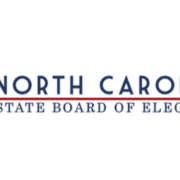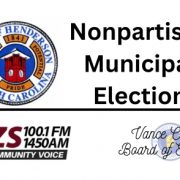Register To Vote By Sept. 12 In Upcoming Municipal Elections
Voter registration deadlines are approaching for eligible North Carolinians who wish to vote on Election Day in October and November municipal elections.
Municipal elections in Vance County take place Tuesday, Oct. 7. The deadline to register to vote in this election is 5 p.m. on Friday, Sept. 12.
The N.C. State Board of Elections has issued a press release with details and requirements about voter registration.
“To vote in a municipal election, you must be a resident of the municipality. Working within city, town, or village limits does not make a voter eligible to vote in municipal elections. Similarly, while a voter’s postal address may indicate a municipality, that does not always mean their residence is within the incorporated boundaries of the municipality,” the press release stated.
Check the state board’s Voter Search tool, to determine if you live in an area that conducts municipal elections by finding a municipality under “Your Jurisdictions.”
Eligible individuals who miss the regular registration deadlines may register and vote at the same time during the in-person early voting period at any early voting site in their county, if early voting is available in their municipality. County-by-county early voting sites and schedules can be found at the State Board of Elections’ Early Voting Site Search, once they are available for each election. Learn more at Vote Early in Person.
Eligible individuals have many options to register to vote, including the following:
- Individuals with a North Carolina’s driver’s license or other NCDMV identification may submit a voter registration application online. Learn more at Complete Your Registration Online Through the DMV. Eligible individuals may also register in person at DMV offices.
- Eligible individuals may also register to vote when applying for services at a number of state agencies. Learn more at National Voter Registration Act (NVRA).
- Any eligible resident can complete a Voter Registration Application in Englishor Spanishon paper and return it to their county board of elections office by 5 p.m. the day of the deadline:
If an application is received after the deadline, it will be timely if it is postmarked on or before the deadline date. If the postmark is missing or unclear, the application will be processed if it is received in the mail no later than 20 days before the election. Otherwise, the application will not be processed until after the election. If submitted by fax or e-mail, the application must be received by 5 p.m. on the deadline date, and a hard copy of the document must be delivered to the county board office by 20 days before the election.
North Carolina residents may not register to vote on Election Day, unless they become eligible after the registration deadline due to becoming a U.S. citizen or having their rights restored following a felony conviction.
Requirements for Registering
To register to vote, a person must:
- Be a U.S. citizen;
- Live in the county of their registration, and will have lived there for at least 30 days before Election Day;
- Be at least 18 years old by the date of the general election (16- and 17-year-olds may preregister to vote); and
- Not be serving a felony sentence, including any period of probation, post-release supervision, or parole.
Updating a Voter’s Registration
Voters who need to update their existing voter registration may use the NCDMV website or a regular voter registration application.
Those with a North Carolina driver’s license or other NCDMV identification may update their residential or mailing address and party affiliation through the NCDMV online service but may not change their name through that service.
If using the paper application to update a registration, it must be signed and mailed to the voter’s county board of elections by the registration deadline. Updates to name, address (if within the county), and party affiliation must be signed, but can be provided by fax or email to your county board of elections. If a voter is using the paper form to update their residential address to a new county, they must return the paper form by mail or in person.



